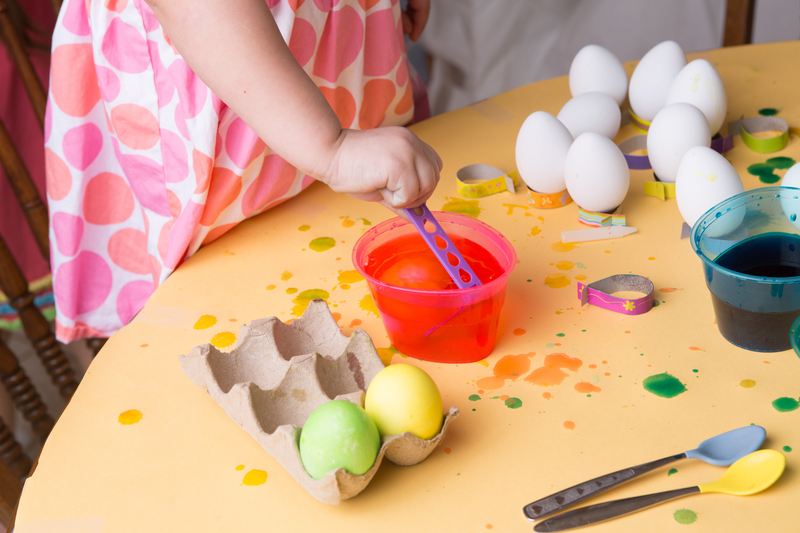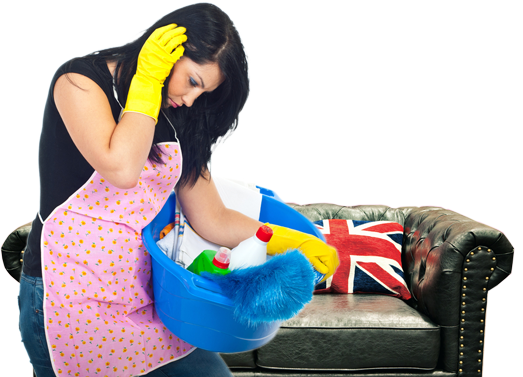Achieve a Pet Odor-Free Sanctuary
Posted on 02/10/2025
How to Achieve a Pet Odor-Free Sanctuary: The Ultimate Guide
Sharing your life with pets brings unparalleled joy, companionship, and love. However, keeping your living space fresh and odorless can become a real challenge for pet owners. If you want to achieve a pet odor-free sanctuary--a truly clean and inviting home--it goes beyond opening a window or spraying an air freshener. This comprehensive, SEO-optimized guide will equip you with expert tips, professional strategies, and practical solutions to eliminate pet odors for good. Let's transform your home into a sanctuary free from pet smells!

Why Do Pet Odors Persist?
Pet odors are caused by various sources, such as fur, skin oils, urine, feces, dander, and even saliva. Dogs and cats can inadvertently spread these odors through your carpets, upholstery, bedding, and air. Rather than masking the smells, understanding their root causes is the first step in attaining a clean, odorless home with pets.
Main Sources of Persistent Pet Odors
- Pet hair and dander: Accumulates on surfaces and in air vents, often carrying subtle odors.
- Accidents: Occasional urine or vomit spots can deeply penetrate carpeting and furniture if not cleaned promptly.
- Pet beds and toys: Frequently neglected in cleaning routines, these can harbor powerful smells.
- Litter boxes: A constant issue for cat owners if not managed daily.
- Unwashed collars, leashes & accessories: These can absorb and retain bad smells.
Establishing a Pet Odor-Free Routine
Consistency is essential to achieving a fresh-smelling home with pets. Let's delve into crucial steps for banishing odors and achieving your own pet odor-free sanctuary:
1. Regular and Thorough Cleaning Practices
- Vacuum Daily: Use a powerful vacuum with a HEPA filter to thoroughly remove pet hair, dander, and dirt from all surfaces. Don't forget baseboards, under furniture, and upholstery.
- Launder Bedding and Fabrics: Wash pet beds, blankets, and frequently used pet-friendly throws at least weekly. Use unscented detergent and add a cup of white vinegar to neutralize odors.
- Steam Clean Carpets and Upholstery: Invest in a quality steam cleaner or rent one monthly to deep clean high-traffic areas and soft furnishings.
Pro tip: Sprinkle baking soda on carpets and leave it overnight before vacuuming for natural deodorization!
2. Address Pet Accidents Immediately
- Act Fast: The sooner you tackle a mess, the less likely odors will set in.
- Blot, Don't Rub: Gently blot up as much liquid as possible using paper towels or a clean cloth.
- Use Enzymatic Cleaners: These break down organic material in urine and feces, effectively removing both stains and smells. Avoid standard household cleaners, which may not neutralize odors at their source.
3. Proper Pet Grooming
- Routine Baths: Regularly bathe your pet using a veterinarian-recommended shampoo suitable for their skin type and breed.
- Brush Out Fur: Frequent brushing removes loose hair and dander that contribute to pet odors around the home.
- Clean Paws and Ears: Wipe your pet's paws after outdoor walks and check for debris or moisture in their ears--common sources of unwanted scents.
Home Remedies for Pet Odor Remediation
Not all odors need commercial chemicals for remediation. Employing natural solutions will help you maintain a pet odor-free home in an affordable and eco-friendly way.
Effective Natural Deodorizers
- Baking Soda: As mentioned earlier, this is a stellar option for carpets and upholstery. Just sprinkle, let sit, and vacuum!
- White Vinegar: Mix equal parts vinegar and water in a spray bottle for cleaning hard floors, walls, or pet stains. It neutralizes odors and helps remove stains.
- Lemon Juice: A natural disinfectant and deodorizer. Add a few tablespoons to your cleaning mix or use it to clean water bowls and litter pans.
- Activated Charcoal: Place small bowls or sachets around the house--especially near litter boxes or in closets--to absorb lingering smells.
Combine essential oils like lavender or eucalyptus with caution and never apply them directly to your pet. Always ensure any scent solution is pet-safe!
Litter Box Odor Management
For cat owners, litter box odor can quickly turn a pleasant room into a malodorous nightmare. Consistency and the right products will support a fragrance-free home with pets.
- Scoop the box at least once daily: More frequently if you have multiple cats.
- Deep clean the litter pan weekly: Wash with hot water and unscented soap, then dry thoroughly.
- Use high-quality, clumping litter: Opt for unscented varieties formulated for odor control without harsh chemicals.
- Location matters: Place litter boxes in well-ventilated areas, away from food prep spaces and rarely-used zones.
Keep Pet Accessories Odor-Free
Collars, leashes, toys, and even carriers can all become sources of hidden odor. For a complete pet scent-free sanctuary, include these items in your regular cleaning schedule:
- Wash toys and accessories weekly: Check labels for washing instructions; many hard toys can be placed in the dishwasher, while fabric items can go in the washing machine.
- Replace worn or damaged items: Old toys and bedding harbor bacteria and will be harder to fully deodorize.
- Sanitize food and water bowls: Clean bowls daily with soap and hot water.
Improve Home Ventilation
Fresh air circulation is crucial for eliminating lingering scents. Poor ventilation allows odors to settle in soft furnishings and corners.
- Open windows and doors regularly: Aim to air out your living space daily if possible.
- Use air purifiers with HEPA filters: These trap airborne particles like pet dander and even odor-causing bacteria, ensuring continuous air freshness.
- Change HVAC filters frequently: If you have forced air heating or cooling, swap out filters every 1-2 months, more often with pets at home.
Advanced Odor Control Technology
Modern technology provides innovative ways to achieve a pet odorless sanctuary. Whether you've tried all manual tactics or want extra reassurance, consider these upgrades:
- Ozone Generators: Safe for unoccupied spaces, these devices neutralize stubborn pet odors by breaking down molecules in the air.
- Ultraviolet (UV) Cleaners: UV-C light can kill bacteria and viruses that contribute to long-standing odors.
- Air Fresheners with Absorbers: Choose options with activated charcoal, baking soda, or zeolite, specifically designed to capture odors--rather than merely masking them.
Remember, technology is most effective when paired with regular cleaning and good ventilation.
Prevent Future Odors with Proactive Training
Prevention remains the best long-term strategy to maintain a pet odorless home. Address potential odor sources at the root through training and proper pet care.
- House Train Consistently: Establish a clear routine for bathroom breaks, and reward your pet for appropriate behavior.
- Discourage Marking: Spay/neuter pets and consult a trainer or behaviorist if marking persists.
- Fear-Free Vet Visits: Maintain regular vet appointments to address health issues (like UTIs or skin infections) that could produce unpleasant smells.
The Power of Routine: Your Checklist for a Pet Odor-Free Sanctuary
- Vacuum and mop floors: Minimum of twice per week.
- Wash pet bedding and soft toys: Weekly.
- Scoop litter boxes and clean cages: Daily to every other day.
- Bathe and groom pets: Per vet recommendations (typically every 4-8 weeks for dogs, as needed for cats).
- Sanitize food and water bowls: Daily.
- Replace air filters: Monthly.

Frequently Asked Questions: Achieving a Fresh Pet Home
Can I have a pet but still maintain a fresh-smelling house?
Absolutely! With consistent cleaning, the right products, good ventilation, and proper pet care, it is entirely possible to achieve a pet scent-free sanctuary.
Are scented candles safe to remove pet smells?
Scented candles may help mask pet odors briefly, but they do not remove the source. Some scents and ingredients can also be harmful to pets--always use with caution, and never rely solely on candles for deodorizing.
Should I use homemade or commercial cleaners?
Both have benefits. Enzymatic cleaners are specifically designed to break down pet residues, while solutions like vinegar and baking soda can be effective for everyday cleaning and deodorizing.
Conclusion: Enjoy Your Pet Odor-Free Sanctuary
It is possible to enjoy your pets while preserving a fresh, inviting, and odor-free home. By being proactive, consistent, and well-informed, you can tackle sources of pet odors head-on and transform your house into a true sanctuary for both you and your furry companions. Use the strategies in this guide to achieve a pet odor-free sanctuary that every visitor--and your nose--will appreciate!





